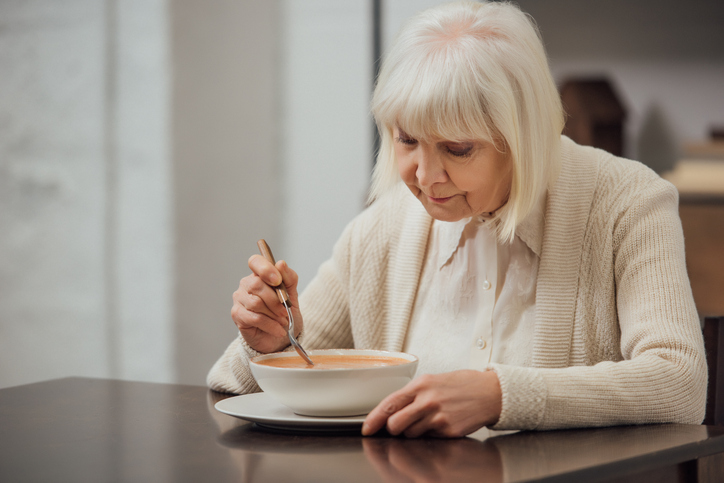
Lack of appetite in older adults is common, but needs to be dealt with promptly so loved ones can maintain proper nutrition.
You’ve just made a big batch of Mom’s special chili recipe. Your house smells yummy, and you cannot wait to dig in. However, while you are savoring not merely the taste but the memories the meal invokes, Mom is simply stirring the food around in her bowl. And it is not the first time. Recently her interest in food is diminishing, and it’s starting to concern you.
What Are Some Common Causes for Lack of Appetite in Older Adults?
Lack of appetite in older adults is actually quite common, for multiple reasons, including:
- Problems with chewing, swallowing, or self-feeding
- Grief and/or depression
- Difficulty with preparing meals
- Dehydration
- Loneliness and having no one to share meals with
- A sedentary lifestyle
- Feeling as though they have lost control over other aspects of life
- A routine that does not include regular mealtimes
- Loss of smell or taste that makes food less appealing
It’s crucial to first speak with the person’s doctor and dentist to rule out any health problems or medication side effects that could be causing the problem. Once it’s established that there is not a medical basis for the change in appetite, try these suggestions to help improve the person’s enjoyment in eating.
- Provide high-calorie foods in small amounts. As opposed to three large meals per day, try smaller servings more often. You can still prepare larger batches of favorite recipes, splitting them up into individual portions that can be frozen and reheated. Other foods to try that will provide essential nutrients include cheese, peanut butter or other nut butters, finely chopped meat or eggs, yogurt, avocado, diced fruit, and whole milk.
- Incorporate softer options. During the summer months when fresh fruit is particularly appetizing, try blending up some healthy smoothies. Summer can be a great time for milk shakes, ice cream, and frozen yogurt. Make it even more fun and festive by inviting the family over to make their own unique treats and enjoying them outdoors together.
- Create a schedule. Instead of waiting until the person says they’re hungry, designate times each day and stick to a routine for eating. It could take some experimentation to discover the best schedule, but give the new routine time to work before fine-tuning. Be sure the person’s routine includes plenty of exercise and physical activity as well, which helps to enhance appetite.
- Adapt foods and utensils accordingly. If self-feeding is challenging, there are a variety of adaptive utensils to explore. You can also make eating easier by serving food that is cut into small, bite-size portions, as well as finger foods such as string cheese, fish sticks, chicken tenders, sandwiches, etc.
Abby Senior Care is here to help older adults conquer barriers to eating healthy. We can prepare nutritious meals and snacks, provide inspiration to stay physically active, and offer friendly companionship during mealtime to make it more enjoyable. Call us at 303-699-8840 or reach out to us online to learn more about our in-home care services in Littleton, Lakewood, Centennial, and other nearby communities and how we can help a person you know.
